Example Herbal Healing Plan: A Structured Approach to Daily Wellness
Creating a daily herbal healing plan allows you to incorporate the benefits of herbs seamlessly into your routine, providing support for digestion, immunity, stress management, inflammation, and sleep. This example plan offers a simple yet effective approach to using herbs throughout the day, addressing various aspects of your health. Remember, consistency is key with herbal remedies, and the structure below can be adapted based on your personal needs, preferences, and goals.
Morning Routine: Start Your Day with Digestive and Immune Support
The morning is an ideal time to give your body a boost for the day ahead. By stimulating digestion and supporting your immune system early on, you set yourself up for better energy, focus, and resilience.
Start: Begin your day with a cup of ginger tea. Ginger is renowned for its ability to stimulate digestion by promoting the production of digestive enzymes. It also enhances circulation, helping to warm the body and increase blood flow. Starting the day with a digestive boost ensures that your system is primed for the meals ahead, reducing bloating or discomfort later in the day.
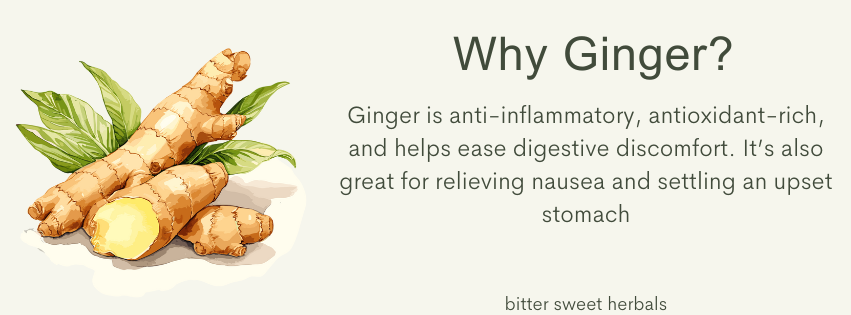
Supplement: After your ginger tea, take an echinacea capsule. Echinacea is a powerful immune-boosting herb that helps your body fight off infections, particularly during cold and flu season. By taking it in the morning, you give your immune system a head start, fortifying your defenses against pathogens.
Why Echinacea: Echinacea is often used for its immune-modulating effects. It’s been shown to reduce the severity and duration of colds, making it an excellent daily supplement, especially in environments where you may be exposed to illness.
Afternoon Routine: Manage Mid-Day Stress and Promote Calm
The afternoon is often when stress begins to build, and your energy levels may start to dip. Incorporating herbs that reduce stress and promote relaxation can help you stay balanced throughout the rest of the day.
Snack: Around mid-day, enjoy a calming cup of chamomile tea. Chamomile is well-known for its gentle calming effects, making it perfect for easing the stress that can accumulate as the day progresses. It helps soothe the nervous system, promotes a sense of well-being, and can even support digestion, which may be beneficial after lunch.
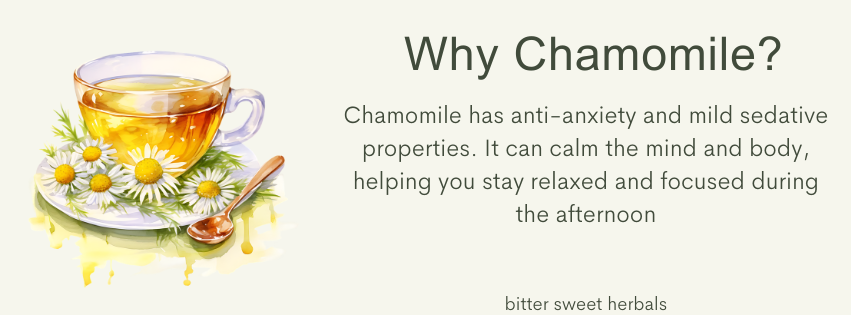
Tincture: Along with your afternoon tea, take a few drops of ashwagandha tincture. Ashwagandha is an adaptogen, meaning it helps your body cope with physical and mental stress. By supporting your adrenal glands, ashwagandha helps regulate cortisol levels, keeping you calm and balanced even during hectic days.
Why Ashwagandha: As an adaptogen, ashwagandha works over time to improve your body’s ability to handle stress. It supports energy levels, reduces feelings of anxiety, and can help maintain mental clarity throughout the day.
Evening Routine: Support Inflammation and Prepare for Restful Sleep
Evening is a time to wind down, nourish your body, and prepare for rest. Herbs that support inflammation and promote relaxation are ideal during this part of the day.
Dinner: Add turmeric to your evening meal. Turmeric is well-known for its anti-inflammatory properties, largely thanks to its active compound, curcumin. Including turmeric in your diet helps reduce inflammation, support joint health, and enhance overall well-being.

Before Bed: End your day with a cup of valerian root tea. Valerian is a potent herb for promoting relaxation and restful sleep. It works by calming the nervous system, helping you fall asleep more easily and improving the quality of your sleep throughout the night.
Why Valerian: Valerian is a natural sedative and is commonly used for insomnia, anxiety, and nervous tension. Drinking valerian tea before bed can help you unwind and prepare for a deep, restorative sleep.
Weekly Review: Adjust and Optimize Your Herbal Routine
Herbal healing is dynamic, and it’s essential to monitor how your body responds to the herbs you’re using. Each week, take the time to assess your progress and make adjustments as needed.
Review: At the end of each week, review your health journal to track how you’ve been feeling. Note any changes in your symptoms, mood, energy levels, or sleep quality. This documentation will help you identify what’s working well and what might need adjustment. For instance, if you notice that you’re still feeling stressed in the afternoons, you may want to increase your dose of ashwagandha or try a different adaptogen like rhodiola.
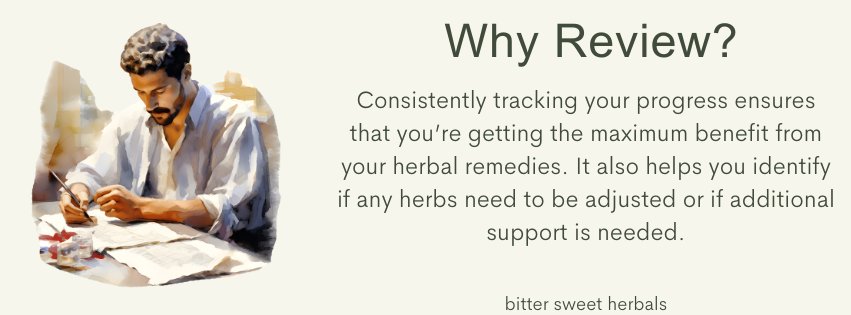
Consult: Regularly check in with your healthcare provider or herbalist. Whether through a formal consultation or a quick discussion, their guidance is invaluable for adjusting dosages, exploring new herbs, or addressing any side effects you might experience. Your health needs may change over time, and a professional can help you tailor your herbal regimen to those changes.
Why Consult: Professional guidance ensures that your herbal plan stays aligned with your overall health goals and any underlying medical conditions. An experienced herbalist or healthcare provider can offer insights into new herbs or strategies you may not have considered.
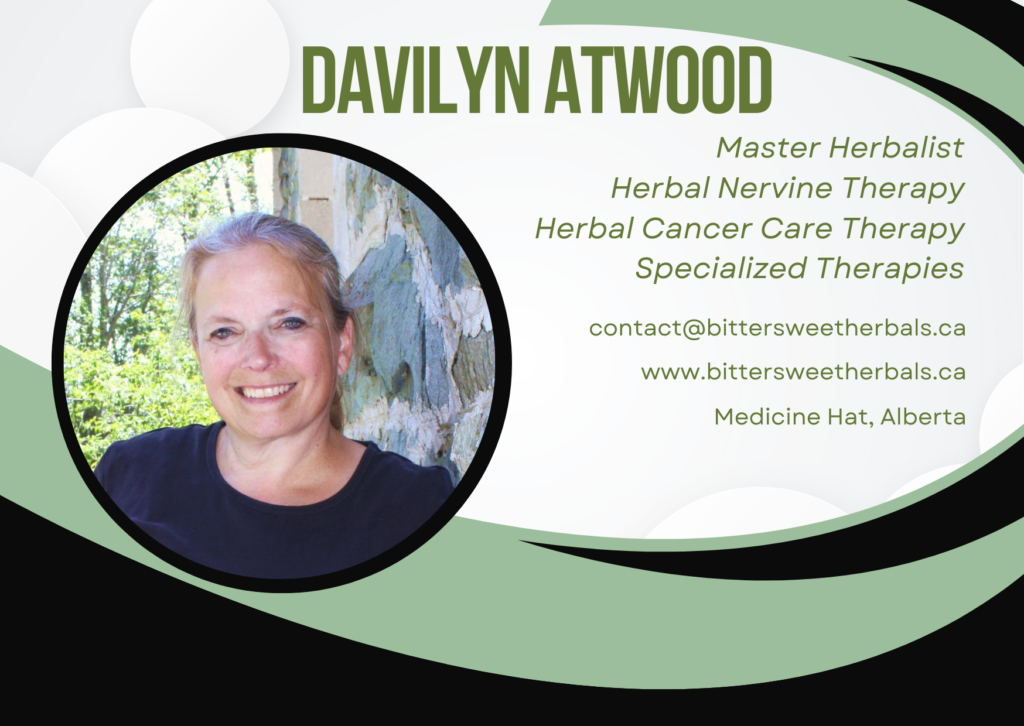
This example herbal healing plan is a gentle yet comprehensive approach to supporting various aspects of your health throughout the day. By integrating herbs into your morning, afternoon, and evening routine, you can address key areas such as digestion, immune function, stress management, inflammation, and sleep. Weekly reviews and consultations with a healthcare professional ensure that your plan evolves with your needs, allowing you to experience the full benefits of herbal medicine in a personalized and effective way.
Conclusion: The Path to Personalized Herbal Healing
By following these steps, you can effectively integrate herbs into a holistic approach that supports your unique health needs. The beauty of herbal medicine lies in its adaptability and the way it works in harmony with your body’s natural processes. However, it’s important to remember that herbal healing is not one-size-fits-all. What works for one person may not work in the same way for another, and that’s why personalization is so crucial.
Each individual’s body, lifestyle, and health goals are different, and herbs should be used as part of a broader strategy that is tailored to those differences. Carefully selecting herbs based on your specific needs, adjusting doses, and experimenting with different formulations are all part of the process of finding what works best for you.

Moreover, consistent use of herbs is key to unlocking their full potential. While pharmaceuticals often provide quick, symptomatic relief, herbs typically work gradually, nourishing and supporting your body over time. By committing to daily use and monitoring your progress, you give these gentle but powerful remedies the time they need to create lasting change.
Stay Curious and Informed
Herbal medicine is an ever-evolving field, and it’s important to stay curious and informed as you continue your journey. New research, practices, and insights are constantly emerging, which can provide fresh perspectives on how to use herbs more effectively. By continuously educating yourself—whether through reading, attending workshops, or consulting with experts—you empower yourself to make more informed decisions about your health and well-being.
Allow Your Herbal Journey to Evolve
As your health changes over time, so too should your herbal regimen. Perhaps an herb that supported you during a stressful time may no longer be needed, or maybe you’ll discover new herbs that better suit your evolving needs. By regularly reviewing your progress and consulting with professionals, you can fine-tune your approach and keep it aligned with your current state of health.
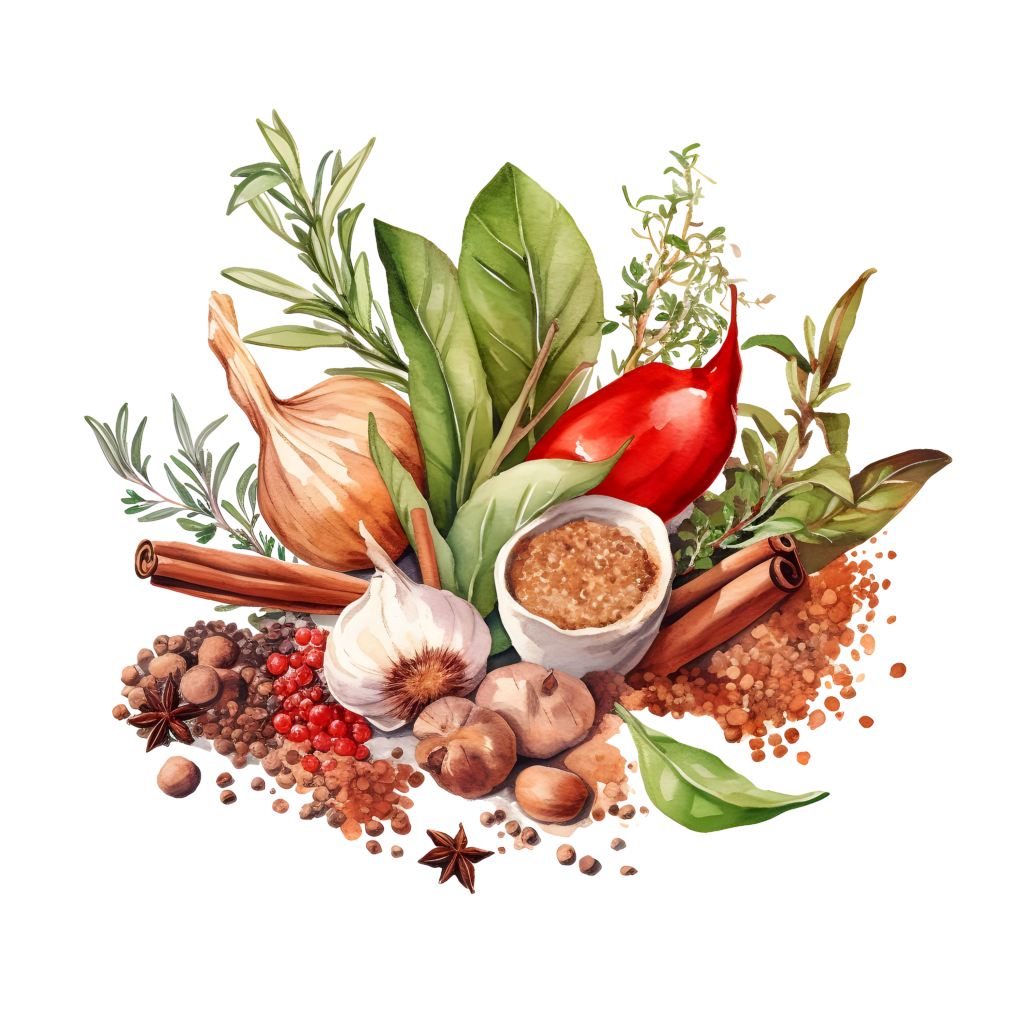
Embrace the fluidity of herbal healing, and don’t be afraid to make adjustments. Your body will communicate what it needs, and by staying mindful and observant, you can respond accordingly. Whether you’re seeking support for digestion, immunity, stress, or sleep, herbs are here to offer their gentle guidance, helping you restore balance, resilience, and vitality.
In the end, your herbal journey is a personal and ongoing process of discovery. With personalization, consistent use, and an open mind, you’ll be able to tap into the transformative power of plants, enhancing your health and well-being naturally.
My Approach To Using Herbal Therapies for Health Part 1
Creating a Personalized Herbal Therapy Plan Part 2
Fine Tuning Your Herbal Plan for Optimum Results Part 3
Creating a Holistic Approach to Healing – Part 4
Educate Yourself Continuously: The Key to Empowered Herbal Healing Part 5
A Structured Approach to Daily Wellness – Part 6 – Conclusion
